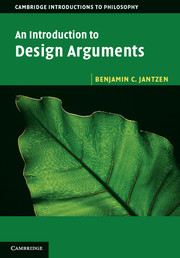Book contents
- Frontmatter
- Dedication
- Contents
- List of figures and tables
- Preface
- 1 Introduction
- 2 Preliminaries
- 3 Arguments from antiquity
- 4 Medieval arguments
- 5 The golden age of natural theology
- 6 Unusual design arguments
- 7 Hume
- 8 Paley
- 9 Darwin
- 10 Loose ends
- 11 The modern likelihood argument
- 12 Intelligent design I: irreducible complexity
- 13 Intelligent design II: specified complexity
- 14 What is complexity?
- 15 Supernatural agents and the role of laws
- 16 A brief survey of physical law
- 17 Fine tuning I: positive arguments
- 18 Fine tuning II: objections
- 19 Conclusion
- Bibliography
- Index
8 - Paley
Published online by Cambridge University Press: 05 June 2014
- Frontmatter
- Dedication
- Contents
- List of figures and tables
- Preface
- 1 Introduction
- 2 Preliminaries
- 3 Arguments from antiquity
- 4 Medieval arguments
- 5 The golden age of natural theology
- 6 Unusual design arguments
- 7 Hume
- 8 Paley
- 9 Darwin
- 10 Loose ends
- 11 The modern likelihood argument
- 12 Intelligent design I: irreducible complexity
- 13 Intelligent design II: specified complexity
- 14 What is complexity?
- 15 Supernatural agents and the role of laws
- 16 A brief survey of physical law
- 17 Fine tuning I: positive arguments
- 18 Fine tuning II: objections
- 19 Conclusion
- Bibliography
- Index
Summary
Who was William Paley?
In the modern era, there is no bigger name in natural theology than that of William Paley. He ended Cicero’s nearly 2,000-year reign as the principal authority on the subject. Prior to 1800 CE, Cicero was widely cited and widely emulated. Even Hume composed his critique as a dramatic dialogue that closely imitated Cicero’s De natura deorum. By the 1830s, however, Cicero had moved to the footnotes and the work of William Paley had become the most ubiquitously cited, referenced, and quoted. There is little in Paley’s biography to foreshadow this intellectual upset. By all accounts his life was uneventful. In 1743, he was born into relative comfort as the eldest son of the Reverend William Paley. The younger William was regarded as a bright but clumsy young man, fond of fishing. When he exhausted the resources of the local school, he was sent off to Cambridge University at the tender age of 16. There, like his intellectual forebears John Ray and William Derham, he was ultimately ordained in 1766.
When he was later elected fellow of his old Cambridge college, Paley returned to teach. It was as an instructor in moral philosophy that he began to stand out. His lectures were innovative and well received, and he drew upon them to write his first book, The Principles of Moral and Political Philosophy in 1785. The book attempts to ground a utilitarian ethics upon the will of God and was a great success. It was followed by another, Horae Paulinae, in which Paley tries to authenticate the narratives of the New Testament, in particular the story told by the letters attributed to Paul. It is somewhat ironic that his strategy in that book is to argue that similarities among the various biblical texts are not the product of design. This book was succeeded by Evidences of Christianity – a broader attempt to marshal historical evidence in favor of the faith. It was so highly regarded that by the time a young Charles Darwin was a student at Cambridge, it had been made part of the standard curriculum.
- Type
- Chapter
- Information
- An Introduction to Design Arguments , pp. 118 - 135Publisher: Cambridge University PressPrint publication year: 2014



